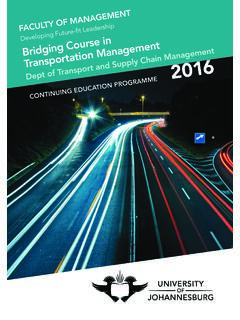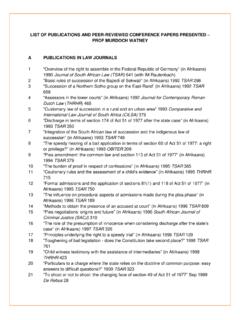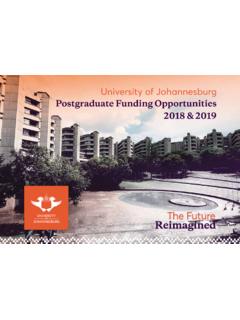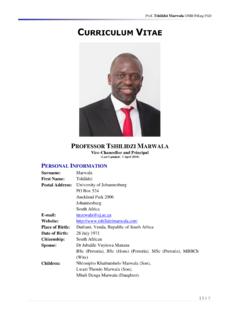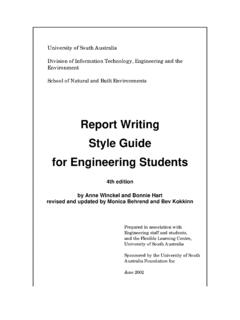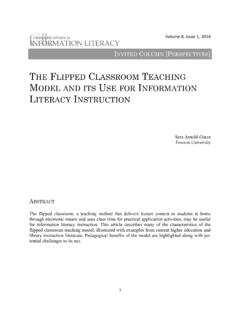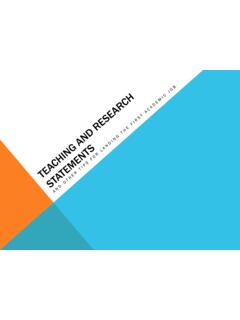Transcription of Advanced Diploma in Technical and Vocational Teaching ...
1 Advanced Diploma in Technical and Vocational Teaching , engineering Studies (Online)The Faculty of Education at UJ is committed to knowledge making for 21st century education. To this end, the Faculty offers an Advanced Diploma in Technical and Vocational Teaching (Adv Dip (TVT)) programme focusing on engineering studies as from 2021. College-based Work Integrated Learning (WIL), including supervised and assessed Teaching practice, as well as workplace practice in industry is an important part of the Adv Dip (TVT) programme. PURPOSEThe purpose of the Adv Dip (TVT) programme is about the empowering of TVET lecturers towards education and work.
2 A TVET lecturer consequently needs pedagogical practices that will prepare TVET students for the world of work. Professional TVET lecturers are therefore seen to be competent in Teaching for work . The programme serves as a capping qualification that enables a graduate or diplomate who already possesses a general undergraduate Bachelor s degree or Diploma to become a professionally qualified TVET lecturer. The programme offers entry-level professional Teaching preparation for graduates/diplomates to develop focused knowledge and skills as lecturers in a particular TVET field or subject. TARGET GROUPTVET lecturers lecturing in the engineering fields of study, namely in the NC-V, Civil engineering and Building construction, Electrical infrastructure construction and engineering and related design as well as the N programmes, namely Civil engineering , Electrical engineering and Mechanical engineering may apply for this ENVISAGED OUTCOMES OF THIS PROGRAMMETVET lecturers who complete this programme will be able to: Teach their subject, and select, sequence and pace subject content in accordance with subject and student needs and the requirements of the curriculum.
3 Manage their Teaching environments effectively in order to enhance learning; Develop and administer assessment in varied and reliable ways, and use the results of assessment to improve their own practice and students understanding; Equip themselves for incorporating work into Teaching and for preparing their students for the demands of the workplaces; Engage with the TVET context, including the policy environment and contextual realities of the sector, in order to adjust their practice appropriately; Deal with diverse socio-economic contexts, ages, cultural backgrounds, life and work experience, learning styles and aspirations, and special education needs of their students, to ensure maximum student success; Communicate effectively through Advanced speaking, reading and writing skills in the language of learning and Teaching ; Integrate information and communication technologies in an effective manner for their own and students progress; Embody positive work ethic and values in a manner that honours and advances the Vocational Teaching and training profession.
4 Reflect critically in, and with, the professional community of practitioners, on their own practice, in order to improve and adapt to changing environments. To achieve the outcomes the programme integrates the knowledge mix of disciplinary, pedagogical, practical, and situational learning through the following in the programme: Disciplinary learning: Includes the study of education and its foundations; and, the study of specific and specialised subject matter relevant to subject specialisations. Key themes include education studies in TVET and its foundations, and being a reflective practitioner. Pedagogical learning: Includes general pedagogical knowledge in terms of the principles, practices, methods of Teaching and assessment, inclusive education and an understanding of the barriers to learning; and, specialised Pedagogical Content Knowledge (PCK) in respect of the concepts, methods, rules and practices of a subject specialisation.
5 Key learning outcomes encompass pedagogy and specialised PCK in relation to subject matter that relates to materials, people or symbols. Practical learning and work-integrated learning: This involves learning in, and from, practice. Learning to teach is central to practical learning; and, knowledge of the skills, techniques and practices as they are applied in business and industry in a specialised subject field makes up the remainder of practical learning. Situational learning: This refers to the varied contexts and environments, including policy, political, organisational and economic environments that will influence Teaching and learning in the TVET context.
6 Challenges such as HIV and AIDS, unemployment, poverty, the economy, diversity of the student body, including gender issues, inclusivity and environmental sustainability will be the main topics of this OF THE PROGRAMME AND OFFERINGThe programme will be offered part time over two years in the distance education mode. The coursework will be offered fully online while the practical experience (practical learning and work-integrated learning (WIL) will be conducted in industry and at faculty partner the first year, TVET lecturers register for the modules: Disciplinary learning (generic), General pedagogy (generic) and Learning from work (subject specialisation).)
7 In the second year, TVET lecturers register for the modules: Specialised pedagogy (subject specialisation), situational learning (generic) and Learning to teach (subject specialisation).Access to the Internet, University library and website is REQUIREMENTSTo gain admission into the Advanced Adv Dip (TVT) a potential student should possess one of the following qualifications in any of the engineering fields of study mentioned above: An appropriate 360-credit qualification at exit level 6 of the National Qualifications Framework (NQF), undergraduate Diploma (including college Diploma ); or A level 7 bachelor degree, namely one that includes adequate disciplinary learning in cognate academic fields at the exit level of the prior qualification.
8 The prior qualification is linked to Teaching specialisation relevant to the TVET POSSIBILITIESThe completed Adv Dip (TVT) has the following articulation possibilities: Vertical articulation to further students educational careers: Graduates/diplomates who have completed the Adv Dip (TVT) may proceed to a 120C NQF level 8 Bachelor of Education Honours degree, or a 120C NQF 8 Postgraduate Diploma in Technical and Vocational Education and Training provided that they meet all the minimum entry requirements. Horisontal articulation: Professional qualified lecturers who are not in possession of a first Bachelor s degree may present a 120C NQF 7 completed Adv Dip (TVT) for entry into a 480C NQF level 7 Bachelor of Education in Technical and Vocational COMPETENCYAll qualifying Adv Dip (TVT) students should be proficient in the use of at least one official South African language as a language of learning and Teaching (LoLT), and partially proficient ( sufficient for purposes of basic conversation) in at least one other official African language, or in South African Sign Language, as a language of conversational competence (LoCC).
9 If the LoLT is English or Afrikaans, then the LoCC must be an African Language or South African Sign Language. All new certificates are to be endorsed to indicate the holder s level of competence in specific languages by using appropriate labels, for example: LoLT (English) and LoCC (isiZulu). A UJ short learning programme (SLP) in isiZulu will be on offer at an additional cost to those that do not meet the language competency requirements. This SLP must be successfully completed for an Adv Dip (TVT) student to graduate. The following demonstrable competencies in LoCC will be accepted: An African home language Grade 12 school subject Successful completion of the UJ short learning programme in IsiZulu or an equivalent certification from another COMPETENCYAll Adv Dip (TVT) graduates must be digitally fluent requiring a high level of ICT competency.
10 Where necessary, students that were identified lacking sufficient ICT skills will be required to complete an online short learning programme (SLP) in Basic computer skills. This SLP must be successfully completed for an Adv Dip (TVT) student to all the minimum entry requirements does not guarantee acceptance into a particular programme. The faculty reserves the right to limit numbers in line with its enrolment targets. The Faculty of Education also reserves the right to cancel an application or registration in the event that there are insufficient student enrolments to ensure the viability of the electives in the Adv Dip (TVT) programme.


